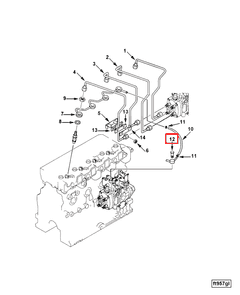This truck part is made by Cummins®. We guarantee that all of our parts are from the OEM (original equipment manufacturer), ensuring a proper fit and quality manufacturing.
We honor the warranty provided by the original equipment manufacturer.
The 4900310 Banjo Connector, a component manufactured by Cummins, plays a significant role in the operation of commercial trucks, particularly in their hydraulic and fuel systems. Understanding its functionality contributes to better maintenance practices and system reliability.
Basic Concepts of Banjo Connectors
A banjo connector is a fitting used in fluid systems to join hoses or pipes. It consists of a short, tubular body with bolt holes at one end and a threaded fitting at the other. The bolt holes allow for the attachment of a hose or pipe, while the threaded fitting connects to another component in the system. In a truck’s hydraulic or fuel system, banjo connectors facilitate the transfer of fluids under pressure, ensuring the smooth operation of various systems 1.
Purpose of the 4900310 Banjo Connector
The 4900310 Banjo Connector is designed to connect hoses or pipes within a truck’s hydraulic or fuel system. Its role is to provide a secure and leak-free connection, allowing for the efficient transfer of fluids. This connector is integral to maintaining the integrity of the system, ensuring that fluids are delivered where needed without loss or contamination.
Key Features
The 4900310 Banjo Connector is constructed from high-quality materials, ensuring durability and resistance to corrosion. Its design includes precise threading and sealing surfaces to prevent leaks. Additionally, the connector may feature integrated gaskets or o-rings, which further enhance its sealing capabilities and differentiate it from other connectors.
Benefits
Utilizing the 4900310 Banjo Connector offers several advantages. It contributes to improved system reliability by providing a secure connection that minimizes the risk of leaks. The design of the connector also facilitates ease of installation, reducing downtime during maintenance procedures. Over time, the durability and efficiency of this connector can lead to potential cost savings by minimizing the need for frequent replacements or repairs.
Installation Process
Installing the 4900310 Banjo Connector requires careful attention to detail to ensure a secure and leak-free connection. The process involves selecting the appropriate hose or pipe, aligning the connector, and using the necessary tools to tighten the bolts and threaded fitting. Best practices include checking for proper alignment, ensuring all components are clean and free of debris, and tightening to the manufacturer’s specified torque settings to avoid over-tightening, which could damage the connector or the connected components 2.
Troubleshooting Common Issues
Common issues with the 4900310 Banjo Connector may include leaks or connection failures. Troubleshooting these problems involves inspecting the connector and its connections for signs of wear, damage, or misalignment. Addressing leaks may require tightening the connection or replacing damaged components. Connection failures could necessitate a re-evaluation of the installation process to ensure all steps were followed correctly.
Maintenance Tips
Regular maintenance of the 4900310 Banjo Connector is vital for ensuring its longevity and optimal performance. This includes periodic inspection for signs of wear or damage, cleaning the connector and its connections to remove any buildup, and checking for proper torque on the bolts and threaded fitting. Adhering to these maintenance practices can help prevent issues and ensure the connector continues to function effectively.
Cummins Overview
Cummins Inc. is a global power leader that designs, manufactures, and distributes engines, filtration, and power generation products. With a history spanning over a century, Cummins has established a strong reputation in the commercial truck industry for producing reliable and high-performance components. The company’s product range includes engines, powertrain components, and aftermarket parts, all designed to meet the demanding requirements of commercial vehicles.
Role of the 4900310 Banjo Connector in Engine Systems
The 4900310 Banjo Connector is an essential component in both plumbing and fuel systems within engine setups. In plumbing applications, this connector facilitates the secure joining of hoses to fittings, ensuring a leak-free connection that is vital for the integrity of the system. It acts as a bridge between different sections of the plumbing, allowing for the efficient transfer of fluids while withstanding the pressure variations typical in such systems.
In fuel systems, the Banjo Connector plays a similarly important role. It is often used to connect fuel lines to injectors, filters, or other components, ensuring a consistent and reliable fuel supply to the engine. The design of the connector allows it to maintain a tight seal, which is necessary to prevent fuel leaks that could pose safety hazards. Additionally, it helps in managing the high-pressure environments common in fuel delivery systems, contributing to the overall efficiency and performance of the engine.
Conclusion
The 4900310 Banjo Connector, manufactured by Cummins, is a critical component in the hydraulic and fuel systems of commercial trucks. Its role in providing secure, leak-free connections enhances system reliability and efficiency. Proper installation, regular maintenance, and understanding its key features and benefits are essential for maximizing the performance and longevity of this Cummins part.
SPECIFICATIONS
RECOMMENDED PARTS
* Variable geometry turbocharger and electronic actuator repairs are not eligible to be claimed as over-the-counter under New or ReCon parts warranty for parts installed after October 1, 2018.
* Diesel Oxidation Catalyst (DOC), Diesel Particulate Filter (DPF), Selective Catalyst Reduction (SCR) catalyst, and Electronic Control Module (ECM) repairs are not eligible to be claimed as over-the-counter under New or ReCon parts warranty for parts installed after January 1, 2020.
* These restrictions are only applicable to New parts and ReCon parts coverages for the components listed above sold to a customer in the US or Canada. All other coverages are excluded. All other regions are excluded.

